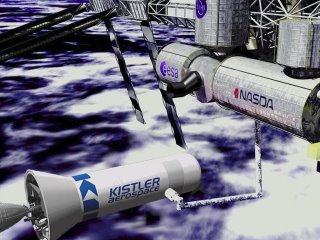 NASA deserves credit for motivating and financially backing private sector initiatives to travel into space. The space agency started a competition for a privately-run workhorse (called COTS for "Commercial Orbital Transportation Services") to assist NASA with future space lifts to the International Space Station (and who knows, maybe the Moon and beyond). NASA's concern is that the Shuttles will go offline in 2010 and the planned Crew Exploration Vehicle may not be available until 2014. The commercial spacecraft could will the gap and meet other future needs as well.
NASA deserves credit for motivating and financially backing private sector initiatives to travel into space. The space agency started a competition for a privately-run workhorse (called COTS for "Commercial Orbital Transportation Services") to assist NASA with future space lifts to the International Space Station (and who knows, maybe the Moon and beyond). NASA's concern is that the Shuttles will go offline in 2010 and the planned Crew Exploration Vehicle may not be available until 2014. The commercial spacecraft could will the gap and meet other future needs as well.So NASA offered the winner(s) of the contest $500 million in seed money, something it has never attempted before. About two dozens companies competed and NASA announced the two winners last Friday - SpaceX and Rocketplane Kistler.
"By stimulating the development of commercial orbital spaceflight, the NASA COTS program will have the same positive effect on space travel as the Air Mail Act of 1925 had on the development of safe and affordable air transportation," said Elon Musk, SpaceX CEO. "Moreover, the requirement for significant private investment and the fact that NASA only pays for objective, demonstrated milestones ensures that the American taxpayer will receive exceptional value for money."
The new support for the space industry could lead to additional spinoffs, including space tourism. Stay tuned.
For more on the contest, click here.
For more on the overall NASA initiative, click here.
Update: A $3.9 billion dollar contract was awarded to Lockheed Martin Corp. to build the Crew Exploration Vehicle. The multi-part contract is expected to cost as much as $7.5 billion through 2019. For more visit this link.

